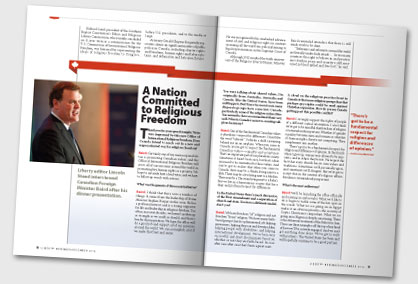A Nation Committed to Religious Freedom
Lincoln E. Steed November/December 2012
Thank you for your speech tonight. We’re very impressed by this new Office of International Religious Freedom. Does Canada intend to reach out in a new and unprecedented way for religious freedom?
Baird: Certainly one of my main responsibilities is promoting Canadian values; and the Office of International Religious Freedom will assist all of our missions around the world in promoting key human rights as a priority. We hope to certainly have a loud voice, and we have to follow up words with actions.
What was the genesis of this recent initiative?
Baird: I think that there were a number of things. It comes from the leadership of Prime Minister Stephen Harper on this issue. He has a profound interest and is a strong supporter for life and leadership in religious freedom. Too often, in recent decades, we haven’t spoken up as strongly as we could or should, and that is key for this inspiration. We hope the office will do a good job and support all of our missions around the world. We can accomplish a lot if we make this front and center.
You were talking about shared values. I’m originally from Australia. Australia and Canada, like the United States, have been melting pots. But I know in recent years many disparate groups have come into Canada; particularly some of the religious minorities. You seemed to have accommodated them very well. What is Canada’s secret to creating religious harmony?
Baird: One of the fundamental Canadian values is pluralism—respect for differences. I don’t like the word “tolerate.” I tolerate a child screaming behind me on an airplane. When you come to Canada, you’ve got to respect the fundamental Canadian values—equality and acceptance. That’s an important part of our pluralistic society. Sometimes it hasn’t been easy, but that’s when you need to be committed to those values. And you’ve got to realize that when you come to Canada, there may be a Hindu living next to a Sikh. There may be a Jew living next to a Muslim. There may be a Christian living next to a Baha’i. But we live in a harmonious society that has a deep and profound respect for differences.
In the United States there’s much discussion of the First Amendment and a separation of church and state. You have a different model, don’t you?
Baird: We have freedom “of” religion and not freedom “from” religion. We have many faith-based groups that do a phenomenal job helping newcomers, helping the poor and downtrodden, helping people with disabilities, and helping international development. We’ve been very successful and don’t discriminate based on whether or not they are faith-based. In case after case after case that’s been a great asset.
A cloud on the religious practice front in Canada is that some religious groups fear that perhaps gay rights could be used against Christian expression. How do you see Canada getting past this possible conflict?
Baird: I strongly support the rights of people of a different sexual orientation. I also think we’ve got to be mindful that freedom of religion is tremendously important. Whether it’s gender equality between men and women or whether it’s human rights, they’re not competing. They complement one another.
There’s got to be a fundamental respect for religion and differences of opinion. In the church where I grew up, women were allowed to be ministers, and in others they’re not. We respect the fact that every church has its own values and traditions. Sometimes we’ll personally agree, and sometimes we’ll disagree. But we’ve got to accept that in the context of religious affairs, freedom is tremendously important.
What’s the next milestone?
Baird: We’ll be launching the office officially and naming an ambassador. What we’d like to do is begin to tackle some of the hot spots in the world. What we see going on in Egypt makes it an obvious priority—the security of Coptic Christians is important. What we see going on in Nigeria is deeply concerning. There is the abhorrent treatment of the Baha’is in Iran. Those are three examples off the top of my head of how we’ll be actively engaged. And we can’t get anything done alone. We’ve got to work with partners. The United States has been and will hopefully continue to be a good partner.
Article Author: Lincoln E. Steed
Lincoln E. Steed is the editor of Liberty magazine, a 200,000 circulation religious liberty journal which is distributed to political leaders, judiciary, lawyers and other thought leaders in North America. He is additionally the host of the weekly 3ABN television show "The Liberty Insider," and the radio program "Lifequest Liberty."